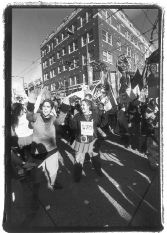WHO GUARDS THE GUARDIANS?
Polestar Music Gallery, 1412 18th, 206-329-4224, $6 9:30 p.m. Sat., Nov. 30
THE LINE BETWEEN sound documentary and sound art was first blurred by Glenn Gould with 1967’s The Idea of North, an exquisitely moving examination of Canadian spiritual and physical isolation. There, and in his subsequent documentaries, Gould brilliantly and lovingly edited interviews into what are really radio tone poems; aside from his brilliance as a pianist, this is his major contribution to modern music.
Armed with a boom mike and a backpack full of equipment, Christopher DeLaurenti, the intrepid Marlin Perkins of Seattle composers, captured hours of the 1999 WTO riots direct from the front lines. He turned these recordings into a breathtaking and gripping hour-long work titled N30: Live at the WTO Protest. The combination of you-are-there immediacy and the unobtrusive artistry of its editing make N30 perhaps the one piece you’ll hear by a Seattle composer that truly deserves the label “masterpiece.”
Now, in contrast to his own on-the-spot recordings, DeLaurenti has fashioned a sequel to his work from police radio transmissions and walkie-talkie communications. N30: Who Guards the Guardians? is not the event itself, but the police’s responses to and descriptions of the event; the actual riot noises are almost always in the background. This distance, this filtering, adds a certain disturbing mystery to the piece. Something’s between you and the happening—not just the cops, but DeLaurenti, too. His earlier piece is in the first person—you’re there within the sound world, with DeLaurenti as your alter ego—but in this new work, he’s acting upon that world, a third-person omniscient manipulator of all you hear. The piece is a patchwork, artfully but disconcertingly jump-cutting from voice to voice.
Serendipity led DeLaurenti to the police recordings.
“The Center on Contemporary Art filed a public disclosure request,” he explains. “The police department complied, dubbed a bunch of tapes, and said whoever wants to listen to these tapes has to come down to a certain little room at a certain little time, and they’re only available for a limited number of days. So [CoCA] called me.”
But how was he allowed to make copies of these tapes?
“I don’t know. . . . I don’t think they cared,” he replies. “Because the tapes they provided were all time-indexed and censored.”
In his piece, DeLaurenti has included a few censored bits—seconds-long gaps of dead air. The time index, a voice with an inexplicable British accent, sounds creepily HAL-ish (“One. Two. Hours. Three. One. Minutes”).
Once word got out that DeLaurenti was collecting recordings of the riots, others contacted him with their own pirated police transmissions.
“There are mp3s floating around on the Net. People were taping them with their own scanners,” he says. “There was a group of folks—I call them ‘The Three Shadows’—who contacted me and said, ‘We heard you got some really great field recordings. We have some stuff—we don’t know if you’re interested in it, but. . . . ‘ I don’t know any of their real names. It wasn’t quite out of James Bond, but it was close. The tapes were never exclusively in my possession, there always had to be someone there. I think that they were maybe running a risk, maybe not, to get them to me.”
DeLaurenti is distributing Who Guards the Guardians? through unconventional channels. He’s giving it away, rather than selling it; contact him via his Web site, www.delaurenti.net, to get a copy, free with a self-addressed, stamped envelope. In addition, 700 copies of the Nov. 20 issue of Eat the State! have a copy of the CD taped inside. To mark the third anniversary of the event, the piece will be broadcast on KEXP (90.3) this Saturday night at 11, after which you’ll be able to download the whole 56-minute piece, 600 megabytes in CD-quality stereo, from the KEXP Web site.
Also on Saturday night, the piece will be played at Polestar Music Gallery on a double bill with a near-legendary recording made during the May 2001 fire at the Speakeasy Cafe. Musician Troy Swanson was performing in the back room when the call to evacuate came; he grabbed his wife and son but left his video camera. When, after a few days, Swanson was able to retrieve his equipment from the Speakeasy’s shell, the soundtrack from this video—including the bursting of windows and the gush of fire hoses—became a you-gotta-hear-this document of the event, heard only privately among friends until this weekend.








